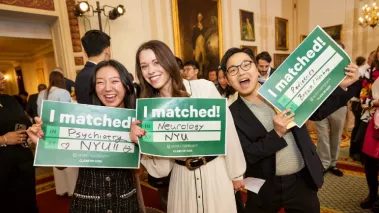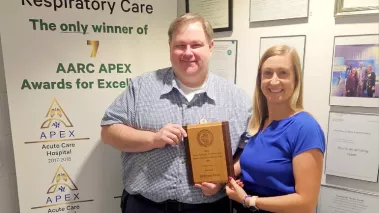Many promising college students from underrepresented groups in medicine dream of wearing a white coat but don’t understand how to navigate the complex and competitive process of applying to medical school. However, dedicated student and faculty mentors at Rush Medical College hope to change that through the Rush Summer Research Scholars Program (RSRSP).
Atzel Albino Martinez, a junior at Dominican University majoring in neuroscience, was one of just 10 students selected from a pool of 122 applicants for the Rush mentorship program, which is open to students from groups that are underrepresented in medicine. This summer, the first-generation college student worked on his first research project “virtually” at Rush while gaining valuable experience to improve his chances of being accepted into medical school.
“I’m now 100 percent sure I want to attend medical school and become a physician,” says Albino Martinez, who was born in Mexico but has lived in Chicago for most of his life. “In the meantime, I know what I have to do from now to the moment I apply in order to become a strong candidate.”
Opening doors to success
Besides Albino Martinez, this year’s research scholars included college students from Vanderbilt, Loyola, the University of Illinois at Urbana-Champaign, the University of Illinois at Chicago and other schools, who were paired with student mentors from Rush Medical College. Albino Martinez was matched with Eric Azua, a second-year medical student from Colorado who was the first in his family to graduate from college.
“This program lets underrepresented students know that there are people who look like them who pursued their dreams and made it this far,” Azua says. “When people are able to see their role models succeed and they look similar to them, it gives them hope that they can achieve those dreams as well.”
Each research scholar is assigned to a project in translational, clinical or community research. Because the COVID-19 pandemic has restricted access to Rush, Albino Martinez worked virtually on a project led by Jorge Chahla, MD, PhD, in the Department of Orthopedic Surgery to analyze the vasculature for the meniscus in the knee. He reviewed the medical literature, established a protocol and produced his own abstract and presentation with coaching from Azua.
Other research projects covered a range of topics, including kidney transplant, Parkinson’s disease, pediatric deformities and the genetics of colorectal cancer.
The program culminated with a virtual research symposium in which the scholars presented their results to their peers and mentors. “Although presenting my project in a symposium was nerve-wracking, it felt good to finally have a final product and be able to talk about it,” Albino Martinez says.
Mentoring via Zoom
While scholars in the inaugural Summer 2019 class met with their student and faculty mentors in person, this year’s class received all of their mentoring online because of the pandemic.
The mentees had virtual meetings with the student mentors on topics such as preparing for medical school interviews and writing a strong personal statement for their applications. They also met with their faculty mentors several times a week and learned more about the health care industry through virtual tours of local health and community organizations. The college students also joined students in other Rush summer programs for biweekly online discussions on current events, including health disparities, systemic racism, police brutality and cancel culture.
“Even though we never met, it really felt like a family,” Albino Martinez says.
“Being a medical student comes with this new territory in which people consider you to be a leader,” says Azua, who is also vice president of mentorship for Rush’s chapter of the Latino Medical Student Association (LMSA). “This experience really gave me the opportunity to take on this whole new leadership position as a medical student.”
Chizelum Ikedi, a senior at University of Illinois at Urbana-Champaign majoring in clinical psychology, agrees. This summer, Ikedi worked with Ruthe Ali, a second-year medical student, and faculty member Gina Piscitello, MD, in the Section of Palliative Medicine on a medical ethics research project. Ikedi helped measure the impact of a one-hour ethics lecture on the knowledge and attitudes of pre-med students, medical students and physicians. Based on the seminar’s success, they also developed a one-hour workshop on race, ethnicity and ethics in the time of COVID-19.
Even though all of their meetings were virtual, Ikedi says the 10 scholars formed a special bond during the six-week program. “I was so blessed to be in this hub of amazing, intelligent people,” she says. Since the program ended, the 10 scholars still meet every other Friday via Zoom to continue to offer each other support.
Receiving social support and practical advice
Gabriella Cs–Szabo, PhD, assistant dean of diversity and inclusion at Rush Medical College and RSRSP director, says the program gives pre-med students the practical and social support they need to achieve their goals, which could have an even broader impact. “If we help the students realize their own power and what they can do with their education and development, we will change society for the better and hopefully change the inequality in health care,” she says.
Ali, who worked with Ikedi on the ethics research, says mentoring programs like this are especially important today given society’s heightened awareness of health disparities and systemic racism. “I strongly believe that representation matters,” says Ali, who is also vice president of Rush’s chapter of the Student National Medical Association (SNMA) for Black medical students. “We need more people who are underrepresented minorities in medicine being able to mentor and also receive mentorship so they can lift up our communities of color,” she says.
Ali, who was born in Ethiopia and grew up in California, says the program can also have a deeply personal impact on mentees beyond helping them with the medical school admissions process. “A lot of this journey can be very isolating, so to know that there are people who care about you and your success, and would go above and beyond to make sure you’re as prepared as possible, is really empowering and needed.”
The application process for next year’s program will open in November or December. Ikedi urges other college students like her who dream of going to medical school to apply, even if they think it’s a long shot. “There are people out there to support you, help you and nurture you,” she says. “I loved this program as I was doing it, but I didn’t know how useful and helpful it was going to be until after it was over.”







